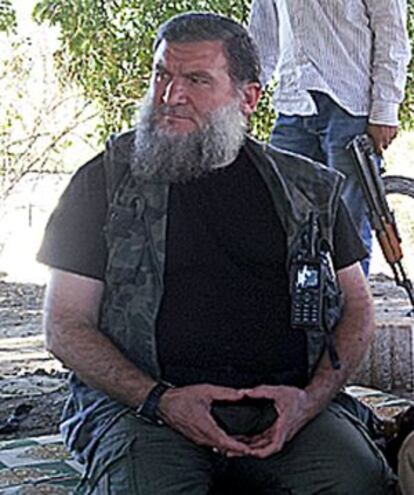The Syrian resident of Spain who died trying to mediate with Islamic State
Mohamed Bahaiah had been known to the Spanish security services for decades He was killed in a suicide attack carried out by ISIS fighters in the Syrian city of Aleppo


“Crush them and kill the conspiracy in the cradle.” The order given by the spokesman for the Islamic State (ISIS), Abu Mohamed Al-Adnani, to declare war on the other rebel groups fighting in Syria to overthrow Bashar al-Asad was not waived for the veteran jihadist who came to negotiate – a Syrian resident who lived in Spain for many years, and who paid with his life for his intervention.
On February 23, 2014, two months after Al-Adnani’s message was posted on the social networks, Mohamed Bahaiah, known as Abu Khaled al Suri, was murdered along with several of his men in the Syrian city of Aleppo in a suicide attack carried out by ISIS fighters. Bahaiah was the envoy of Ayman al Zawahiri, the Egyptian pediatrician who took over from Osama bin Laden at the helm of Al Qaeda Central, sent to negotiate an end to the internal disputes within ISIS.
Bahaiah was the envoy of Ayman al Zawahiri, the Egyptian pediatrician who took over from Osama bin Laden at the helm of Al Qaeda
Weeks before Bahaiah’s death, the Spanish intelligence services tried to meet with him in Turkey, but failed. “He was too trusting. We are certain that his death was ordered by Islamic State. They killed him when he turned up to meet them. This was a meeting with one of Al Zawahiri’s men,” an authorized source has told EL PAÍS.
Bahaiah was well known to the Spanish security services, and there are photographs and videos of him in Madrid and Granada. As with his boss and friend Mustafá Setmarian, another nationalized Syrian, he soon attracted the attention of the authorities when he moved to Spain and began fundraising and recruiting.
Mustafá Setmarian’s right-hand man
Muslim Brother. Mohamed Bahaiah fled Syria to avoid arrest for his activities in the radical Islamist group.
Soldier of Allah. He was an active member of the Soldiers of Allah, a Syrian group set up in the 1980s that brought Salafism to Spain.
Refuge in Afghanistan. In the 1990s, he joined the Taliban, led by Mullah Omar, to fight for the global jihad declared by Osama bin Laden.
Mustafá Setmarian's right-hand man. For three decades, Bahaiah worked closely with Setmarian, who set up Al Qaeda in Spain.
The pair ended up in Madrid in the 1980s, after they fled Syria, then under the rule of Hafed al-Assad, father of the current president, where members of the organization they belonged to, the Muslim Brotherhood, were being hunted down. Along with fellow Syrian Imad Eddin Barakat, alias Abu Dahdah, they created the first Al Qaeda cell in Spain, at a time when only a few police officers were assigned to monitoring their movements, which involved contact with mujahedeen heading off to fight in Bosnia, Afghanistan and Chechnya.
Al Zawahiri’s mediator became a messenger for Bin Laden in Europe, and according to Judge Baltasar Garzón, was financing Al Qaeda from Spain. One intercepted letter sent to an address in Madrid used by his brother-in-law, Ghaleb Kalaje, confirmed for example that the money received by Nabil Kousaibati, another nationalized Syrian who had been condemned to death in Yemen, was sent on Bahaiah’s orders. Kalaje was condemned to nine years in prison for collaborating with Al Qaeda, but Bahaiah was able to escape to Afghanistan along with his wife, the younger sister of Ghaleb.
Al Zawahiri’s mediator became a messenger for Bin Laden in Europe, and was financing Al Qaeda from Spain
Over the course of the last decade, Bahaiah worked closely with Setmarian, who eventually rose to be fourth in command at Al Qaeda Central. “He was his right-hand man,” says a member of the Spanish security forces. He was arrested in Quetta, in Pakistan, in 2005, along with Setmarian. Both disappeared into the secret jails run by the CIA, finally resurfacing in a Syrian jail before the uprising against the al-Assad regime began. In 2012, he was released and allowed to regroup with his family. He later joined Harakat Ahrar al Sham, one of the most powerful rebel groups. A hashtag commemorated the death of the “martyr,” who was killed believing he could mediate a solution to the conflicts within ISIS.
Tu suscripción se está usando en otro dispositivo
¿Quieres añadir otro usuario a tu suscripción?
Si continúas leyendo en este dispositivo, no se podrá leer en el otro.
FlechaTu suscripción se está usando en otro dispositivo y solo puedes acceder a EL PAÍS desde un dispositivo a la vez.
Si quieres compartir tu cuenta, cambia tu suscripción a la modalidad Premium, así podrás añadir otro usuario. Cada uno accederá con su propia cuenta de email, lo que os permitirá personalizar vuestra experiencia en EL PAÍS.
¿Tienes una suscripción de empresa? Accede aquí para contratar más cuentas.
En el caso de no saber quién está usando tu cuenta, te recomendamos cambiar tu contraseña aquí.
Si decides continuar compartiendo tu cuenta, este mensaje se mostrará en tu dispositivo y en el de la otra persona que está usando tu cuenta de forma indefinida, afectando a tu experiencia de lectura. Puedes consultar aquí los términos y condiciones de la suscripción digital.








































